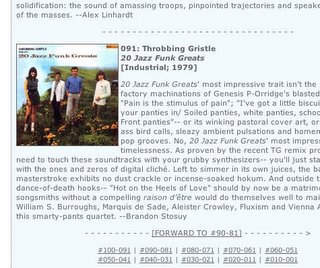Pitchfork and the Idiocy of Lists
 Following up on my last post, I'd like to consider a more specific instance in which Pitchfork passes on the opportunity to offer real depth and discussion: 20 Jazz Funk Greats by Throbbing Gristle, album #91 on its list of the Top 100 Albums of the 1970s. This album is described with phrases like "pulverizing factory machinations," "sleazy ambient pulsations" and "dance-of-death hooks," as well as references to William S. Burroughs and the Marquis de Sade -- imagery that not only lacks a definite musical meaning, but also fails to provide any context for the greater cultural atmosphere in which this album was made (at least beyond an unadorned, passing reference to "1979," the year it was released).
Following up on my last post, I'd like to consider a more specific instance in which Pitchfork passes on the opportunity to offer real depth and discussion: 20 Jazz Funk Greats by Throbbing Gristle, album #91 on its list of the Top 100 Albums of the 1970s. This album is described with phrases like "pulverizing factory machinations," "sleazy ambient pulsations" and "dance-of-death hooks," as well as references to William S. Burroughs and the Marquis de Sade -- imagery that not only lacks a definite musical meaning, but also fails to provide any context for the greater cultural atmosphere in which this album was made (at least beyond an unadorned, passing reference to "1979," the year it was released).If the writer is trying to suggest that the sound of this record is somehow vile and aggressive, then he needs to come out and say so. Then he needs to explain in what way the record accomplishes this effect. (For these are the most basic demands of any critical interpreter!) What instruments are used, and in what way? What is the nature of this ensemble's approach to rhythm, melody, and harmony? If this album employs distortion to challenge the listener's usual perception of song, of tone color and rhythmic foundation, as I suspect it does (because distortion is the basis of most "avant-garde" rock 'n' roll), then what sets it apart from similar experiments by other pop musicians? Is this record really so different from Lou Reed's Metal Machine Music? Or, to frame the question in the context of this list, what separates #91, 20 Jazz Funk Greats, from #83, Raw Power?
The writer has taken for granted that we already have the answers to such questions, a convenient and lazy presumption that is not only the main problem with this blurb, but with most Pitchfork reviews and with rock writing in general: the language is so coy and concerned with its own cleverness, the review winds up ignoring as many relevant details as possible in favor of an attitude or pose. The discourse of indie rock, then, is not about communicating with the world in general, but within a closed circuit of self-declared experts. Which ultimately limits the range of expression to that of a long and usually humorless inside joke.
I mention Throbbing Gristle in particular because I recall that its inclusion on the list initially aroused my curiosity. I recognized the name and had a vague sense of the band's reputation as a founder of the so-called 'industrial music' movement. Throbbing Gristle, it seemed, was one of those bands that hadn't been very relevant in the late-1970s, when it was an active group, but had assumed importance later on, after it had broken up -- once it had been established as influential. Thus I was interested in the establishment of musical legacies and what this process might say about the nature of retrospection. I was also struck by the title, 20 Jazz Funk Greats, which seemed sarcastic and possibly humorous (given that jazz-funk was a popular and rather vapid musical trend circa '79, akin to Muzak, and that this record was, I could only assume, a deafening assault of offensive noise and thus a complete rejection of everything that a jazz-funk hits compilation might represent …). No such explication did I find, however. In fact, this review is one of the least informative things I've ever read.*
So it was a little weird and quite auspicious when my friend, Nick, came into town a couple weeks ago and began recalling his affinity for Throbbing Gristle. Apparently he was a fan in high school and as he talked, I realized that, when compared to Pitchfork's treatment of the band, his experience offers a far more insightful glimpse of Throbbing Gristle's relevance to Generations X and Y.
I'm going to speculate that Nick began listening to Throbbing Gristle around 1994 or '95, when he was a teenager in suburban Detroit. Nick was in an all-black phase then: black hooded sweatshirt, black pants, black Doc Martin boots. I think he even dyed his hair black at one point, around the time he moved to West Michigan and I began to get to know him (summer of '96). He'd recently gotten into a bit of trouble for creating a Web site called Glock 3, supposedly the homepage for a gang of violent thugs from Detroit. The mainstream media, however, believed the site was real and started printing stories about street gangs infiltrating the Internet. Nick's parents found out about it when The Washington Post called his mom for a quote.
"I owned 20 Jazz Funk Greats for a few years and then sold it before I went to college, because I just didn't listen to it that much. I was really into these two groups that members of Throbbing Gristle were involved in later: Download and Coil. Superficially, I was into industrial music because it scared the shit out of my mom, it was really noisy, and because no one else (at least at our high school or my previous high school) listened to it.
"It seemed really violent, and incredibly bleak and abrasive and just totally negative in every way: even to the point of rejecting the notion of musicianship (since it was mostly made on computers). On top of that, the sounds were just interesting to me -- samples of rivet guns and machines crushing things and distorted screams and snarls... Plus, the songs that were the most accessible veered towards dance-ability, and for some reason I've always kind of liked dance music."
And so in 165 words, Nick tells us more about Throbbing Gristle than the Pitchfork writer could with 172: that Throbbing Gristle is merely an entry point to a form of excessively negative, alienating music; that this form is called industrial music and is valued for its abrasive sonic palette, Dionysian tendencies, and the cache of its obscurity. We even become aware of industrial music's particular appeal among rebellious adolescents.
It seems to me that Nick should be writing about music. In any case, I think he's earned a coda:
"I bought the Throbbing Gristle CD because I kept reading about how 'seminal' they were, but I remember being pretty unimpressed -- and thinking the music didn't live up to all the great things people were writing about it. As I understand it, most industrial music owes a debt to Lou Reed; not Throbbing Gristle."

*To be fair, the Pitchfork blurb did offer two substantial pieces of information. One is its suggestion that contemporary Throbbing Gristle remixes aren't as successful as the original cuts off 20 Jazz Funk Greats. And the second is a pair of (unanalyzed) Throbbing Gristle lyrics: "Pain is the stimulus of pain"; "I've got a little biscuit tin/ To keep your panties in/ Soiled panties, white panties, school panties, Y-Front panties."
**Brief addendum
Labels: great records, Pitchfork, The List

